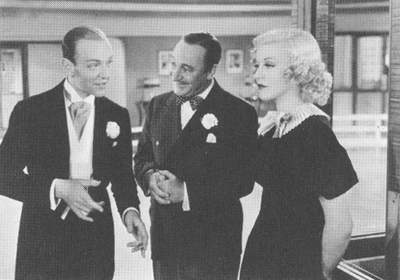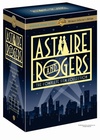


Ginger Rogers and Fred Astaire
Filmography | Lyrics | Articles | Awards | Downloads | Bibliography | Goofs | Statistics | Rankings | Links | Image Credits | Ginger Rogers | Fred Astaire
| Page 6 |
SWING TIME (1936)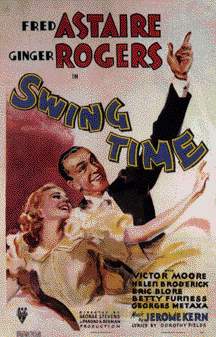 A glorious songburst of gaiety and laughter!
|
At the Gordon Dancing Academy, "To know how to dance is to know how to control oneself." Above, frequent Fred-and-Ginger co-star Eric Blore comically complicates matters as Ginger puts on her best "If you're trying to annoy me, you certainly are succeeding" face. Fred tries to win her over anyway. First known by the names of "I Won't Dance" and "Never Gonna Dance," the film that eventually became SWING TIME (1936) is considered by many to be the best of the series. George Stevens directed, it was Ginger's favorite, and there's no doubt it has a lot going for it. The plot isn't great, but all the songs and dances are excellent, and the supporting characters don't take over too much of the film. At some points SWING TIME doesn't quite have the charm of TOP HAT or FOLLOW THE FLEET, but it doesn't have the dull spots those films do either. Once again Fred is the central figure plot-wise. He plays a compulsive gambler (who fortunately, almost always wins, hence the nick-name "Lucky") and also dances a little on the side in an all-male act. Lucky ditches the dancing however, to get married; only the guys from the act distract him with a pair of dice and a story about how his pants should have cuffs, so when he finally remembers about the wedding, everyone has gone home. In an effort to square things with his fiancée, Margaret, and her father, he agrees to prove his worth by raising $25,000 and then returning to marry her. Thus off he heads to New York (with his magician friend, Pop (played by Victor Moore), tagging along) where he intends to put his luck to the test and win some quick cash. Thanks once again to the guys from the dancing act, when Lucky arrives in New York he finds he has no luggage and no money except his lucky quarter. There's a scene involving a button, a cigarette machine, the lucky quarter, a policeman, and an innocent passerby named Penny Carrol (Ginger), which results in Penny getting reprimanded by the policeman for harassing Lucky. She storms off to her job as a dance instructor, and in an effort to make amends after the misunderstanding, Lucky follows her. Arriving at the Gordon Dance Academy, he pretends to be a klutz, and Penny is forced to give him a free-trial dancing lesson. After repeated falls and a mockingly motivational song entitled "Pick Yourself Up" ( |
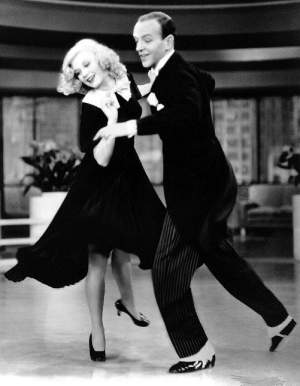 "Now, eh... how did you say that last step went? Eh... oh, yes!" --Lucky. By this, the sixth film in the series, RKO's production team had been advised how the Astaire-Rogers dance numbers were igniting spontaneous applause from theatre audiences. Thus, when SWING TIME swung around, they left ample time after the numbers for such outbursts to occur without disrupting the next scene. Better than just rehiring her, Gordon arranges to get the two of them an audition to perform at the Silver Sandal Café, one of New York's premier night spots. Penny is thrilled and forgives her former annoyance. Unfortunately, Lucky causes them to miss the audition when he loses his clothes gambling, and Penny is mad at him once more. (Noticing a trend?) This time he charms her with Kern and Fields' Oscar-winning song "The Way You Look Tonight," ironically sung to her as she's unglamorously washing her hair, having locked herself in the bathroom to avoid him. She's lured out by his music however, her head covered in suds (which, after experimenting with various soaps and even beat egg whites, were actually formed by whipped cream from the RKO commissary). They get another audition and the job dancing at the Silver Sandal. |
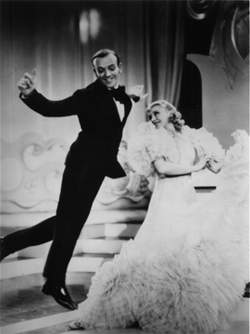 Lucky and Penny do the lovely "Waltz in Swing Time," another of the film's wonderful dance sequences. Notice Fred curling his fingers as opposed to extending them dramatically the way Ginger usually does. He actually does this in most of his dance numbers, owing to his belief that his middle fingers were too long and would look awkward if he extended them. The plot stops making perfect sense when the orchestra leader at the Silver Sandal, Ricardo Romero (who has long harbored a crush on Penny), refuses to play so Lucky and Penny can dance together. The orchestra contract gets passed back and forth throughout the movie between the Silver Sandal and a rival establishment called Club Raymond because Lucky keeps winning and losing it at cards. It hardly matters though. The real problem is that Lucky falls for Penny but refuses to commit to either her or Margaret -- and neither of the ladies knows about the other. Things come to a head when, off more-or-less by themselves in a snowy wood, Penny turns on all her charms and Lucky continues to resist, unsure of how to resolve his dilemma. Penny, exasperated, finally gives up the charade and tells Lucky just what she thinks of his unresponsiveness in a wonderfully funny song called "A Fine Romance." There's something about Ginger's facial expressions that make this number so much more telling than the sentiment expressed by the lyrics themselves. Lucky clues in and realizes which girl he really wants, but the film's not over yet. Margaret comes to New York to find him. There are a few more aspects of this film worth mentioning. First, there are two more fantastic dance numbers: a wonderful song-and-dance combination done by Fred and the chorus girls to "Bojangles of Harlem," and a very moving dramatic dance by Ginger and Fred called "Never Gonna Dance." "Bojangles" is a tribute to Fox's renowned black tap dancer Bill "Bojangles" Robinson which features Fred in blackface (though not the comic Al Jolson kind, and the only time in Fred's career he was thus made up). It includes a neat segment in which he dances with his shadows (thrown on a screen using rear projection) until even they can't keep up with him anymore. "Never Gonna Dance" could be the best of the "tormented lovers" dances that Fred and Ginger do throughout the series. It incorporates an enormous, black double-staircase and flows as smoothly and dramatically as the situation requires. The number took over forty takes to film, and shooting continued through a Saturday evening and into the early Sunday morning hours with Ginger's feet bleeding. "I've danced with you. I'm never going to dance again," Lucky tells Penny. We believe it. The ending of SWING TIME is unfortunately one of its weakest moments. George Stevens tried to close the film by re-using a joke from earlier in the movie that wasn't all that funny to begin with. Furthermore, he milks it for more than it's worth by trying to convince us that the entire cast is absolutely rolling with laughter at it. The first time or two through the film, the scene is a total disappointment, but after one realizes its limitations and gets used to it, the bizarre humor begins to grow on you and it doesn't seem quite so bad after all. Still, for a film as great as this one, it's dissatisfying. Finally, SWING TIME is the film of what-almost-was. In their five preceding films, the audience had never for a moment doubted that Ginger and Fred's characters were in love with each other (except of course, when Ginger was supposed to be mad at Fred -- and even then the audience was often hard to fool). In fact, the impression was so realistic that much of the general public believed they were a couple off the screen too (which they weren't). However, it had been four years and the audience had never seen them "clinch." (There is a minor peck in THE GAY DIVORCEE, and one scene in TOP HAT where Ginger gives Fred a "smack," but it's one-sided and almost brutal -- definitely not romantic.) SWING TIME features the first implied romantic kiss of the series. In fact there are two: one behind a door (conveniently opened just in time to block the camera angle, and from which Fred emerges with lipstick painted on his face), and another at the end when Fred has his back squarely to the camera, blocking everything that could be taking place on the other side. It would be two more films before the real thing would take place in plain sight. |
Go to the next page. |
| Current Contest Prize: |
|---|
| Now in Print! |
|---|
| Now on DVD! |
|---|
Buy Videos & DVDs |
|
Buy Movie Posters |
|
Buy Movie Posters |
|
Classic
Movie Merchandise |
|
![]() Printer-friendly version.
Printer-friendly version.
![]() Return
to the top.
Return
to the top.
Last updated:
December 16, 2008.
Reel Classics is a registered trademark of Reel Classics, L.L.C.
© 1997-2009 Reel Classics, L.L.C. All rights reserved. No
copyright is claimed on non-original or licensed material.
Terms of
Use.




